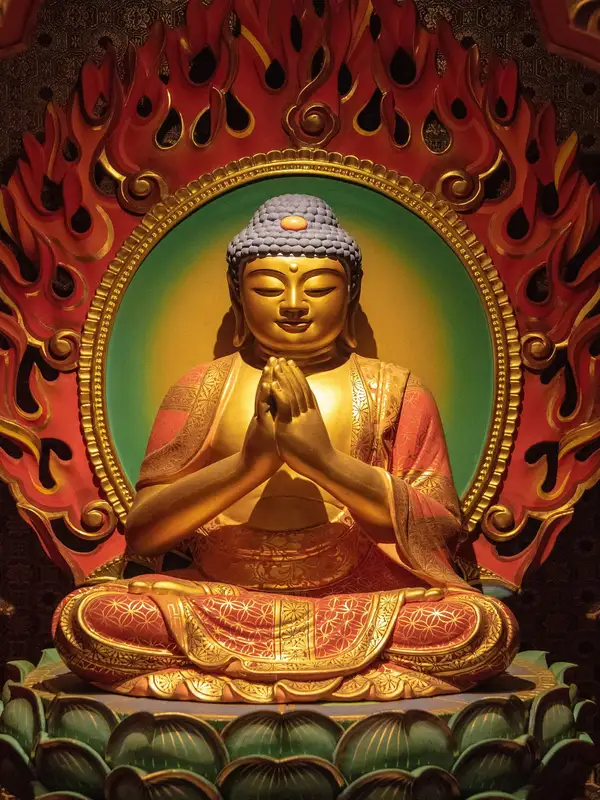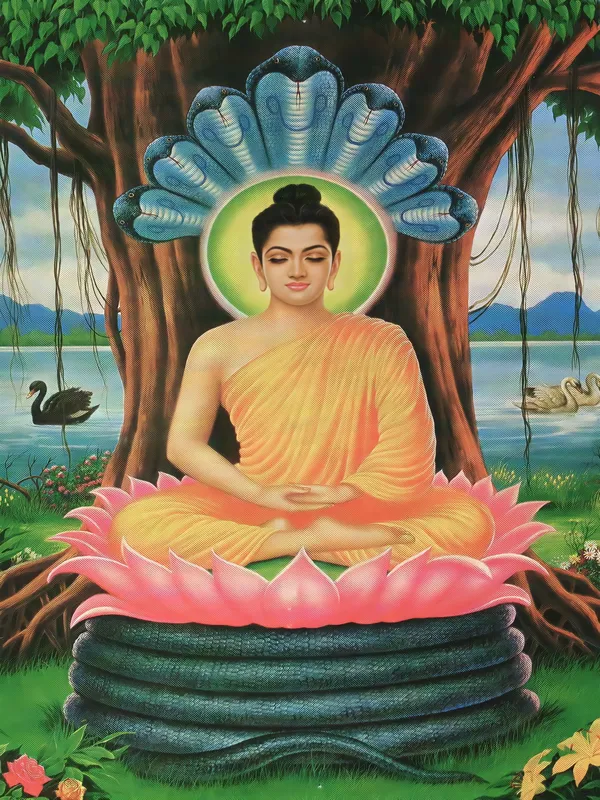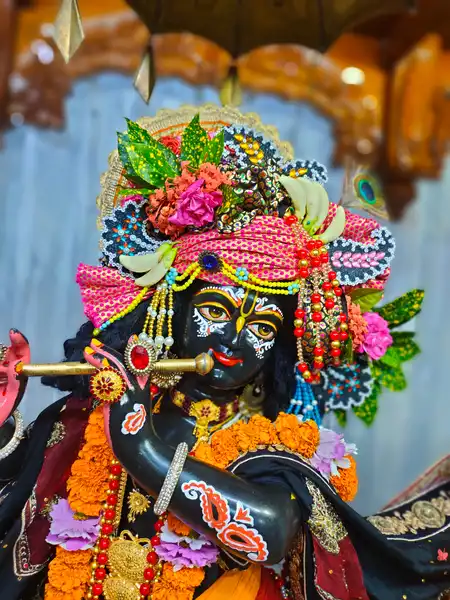Bhagwan Buddha – his life, Authentic Teachings, and 52 Quotes

Introduction:
Namaste! The designation “Buddha,” denoting the “enlightened” or “awakened” individual, pertains to Siddhartha Gautama, originator of Buddhism. This luminary emerged in Lumbini, in contemporary Nepal, during the 5th to 6th century BCE. The sagacious precepts and wisdom propagated by Buddha have indelibly molded the lives of multitudes globally, sculpting the very essence of the Buddhist faith.
Life of Gautama Buddha:
Per the saga, Siddhartha Gautama, later renowned as Bhagwan Buddha, was born approximately 2,500 years past in Lumbini, Nepal. Queen Maya, spouse to King Suddhodana, bore witness to a remarkable dream: a six-tusked, white elephant entering her womb, a sign of impending greatness within her unborn. This omen, once disclosed, affirmed her pregnancy, leading to consultation with the king’s sages, whose consensus ratified the extraordinary nature of the impending child.
In the tranquil embrace of Lumbini’s gardens, the queen delivered a son who, upon birth, strode seven steps while heralding, “I am the paramount sovereign.” A second harbinger of eminence. King Suddhodana, elated, christened the infant Siddhartha. The palace resonated with wise prognosticators, whose divinations aligned in predicting that Siddhartha’s path would culminate in either kingly or spiritual greatness.
Yet, the monarch harbored trepidation that Siddhartha might elect the course of renunciation, embracing spiritual leadership. To forestall this, he ensconced the young prince within opulence and indulgence, aspiring to tether his interest to terrestrial delights.
The Four Sights:
Rooted in Buddhist lore, the youthful Siddhartha Gautama was nurtured amidst opulence and gratification within the sanctuary of his paternal palace. Yet, a pivotal moment beckoned when he ventured beyond these opulent confines and bore witness to the stark realities of suffering and transience inherent in existence.
During his inaugural sojourn beyond the palace precincts, he encountered an aged individual, an infirm soul, and a lifeless body. The suffering unveiled before him left an indelible impression, crystallizing the universal verities of aging, ailment, and mortality.
Upon his subsequent expedition, he crossed paths with an itinerant ascetic, a seeker relinquishing worldly pleasures in pursuit of spiritual illumination. This encounter ignited the flame within Siddhartha, propelling him to forsake the palace’s comforts and embrace the life of an ascetic pilgrim.
Quest for Enlightenment:
Enduring six years, he embarked on diverse routes of asceticism and meditation, striving to surmount suffering and attain enlightenment. Yet, he discovered that the extremes of self-abnegation and mortification did not propel him towards his coveted zenith.
Ultimately, beneath the sheltering embrace of a bodhi tree, he engaged in profound meditation, vowing not to rise until the sought-after revelations were unveiled. Following an extended period of meditation, enlightenment illuminated his being, and thus he metamorphosed into the Buddha, the awakened entity.
Subsequent to his enlightenment, the Bhagwan Buddha dedicated his remaining days to imparting the path of emancipation. Roaming across India’s expanse, he disseminated his wisdom to individuals of diverse vocations.
As his disciples multiplied, he laid the foundation for the first Buddhist monastic communities, providing a haven wherein his adherents could coalesce for communal study and meditation under his sagacious guidance. These monasteries fostered an environment conducive to the deepening of meditation and comprehension of the Bhagwan Buddha’s tenets.
The Bhagwan Buddha espoused a life of frugality and self-discipline to his disciples, redirecting their focus from mundane pursuits to spiritual endeavor. His teachings underscored compassion and benevolence towards all creatures, illuminating the significance of magnanimity and ethical conduct as pivotal to the voyage towards liberation.
In harmony with Buddhist traditions, the Bhagwan Buddha departed this realm at the age of 80 in Kushinagar, situated in modern-day Uttar Pradesh, India.
Before his passing, the Bhagwan Buddha’s odyssey encompassed extensive voyages and teachings throughout India, culminating in a substantial assemblage of monks, nuns, and lay adherents. As the years advanced, health tribulations, notably a vexing foot ailment, besieged him.
One fateful day, journeying with his disciples, he sought solace in Kushinagar. Between two sal trees, he directed his followers to arrange a resting place, where he reclined. The Bhagwan Buddha harbored the awareness that his temporal sojourn was drawing to a close, and he imparted to his devotees his imminent transition into Nirvana—the sphere transcending suffering and rebirth.
Lying there, he persisted in instructing his disciples, magnifying the value of mindfulness and compassion. His parting utterance resonated: “All things are impermanent. Strive on with diligence.”
Subsequent to these words, he delved into profound meditation, his consciousness melding with Nirvana. His corporeal form remained in a meditative posture, a tableau of veneration and gratitude.
The Buddha’s demise serves as a poignant reminder of existence’s transience, urging unrelenting commitment towards liberation from suffering. His legacy endures as a beacon, kindling the spirits of myriad souls worldwide, an influence that perseveres nearly 2,500 years following his passage.
Branches of Buddhism:
Across the ages, diverse Buddhist sects or schools have materialized, each proffering distinctive elucidations of Buddhist doctrines and rituals. Herein lie a few prominent sects of Buddhism:
Theravada Buddhism:
The most ancient extant branch of Buddhism, predominantly observed in Sri Lanka, Thailand, Cambodia, Laos, and Myanmar, centers on personal enlightenment via meditation and the exploration of the Pali Canon.
Mahayana Buddhism:
A subsequent evolution of Buddhism, originating circa the first century BCE and prevailing primarily in China, Japan, Korea, and Vietnam, spotlights the bodhisattva concept. This doctrine posits the pursuit of enlightenment not solely for oneself but also for the betterment of all beings.
Vajrayana Buddhism:
A strain of Buddhism cultivated in Tibet, is distinguished by its utilization of esoteric techniques like mantra repetition, visualization, and mandala engagement. It accentuates the realization of enlightenment within a solitary lifetime.
Zen Buddhism:
An iteration of Mahayana Buddhism that blossomed in China and subsequently disseminated to Japan. Its focal tenets revolve around meditation and mindfulness as conduits to realize abrupt enlightenment, commonly known as “satori.”
Pure Land Buddhism:
A variant of Mahayana Buddhism that underscores the veneration of Amitabha Buddha. It holds that Amitabha has established a Pure Land or paradise in the Western quadrant of the cosmos, facilitating easier enlightenment and rebirth for beings.
These are but a selection of the primary Buddhist sects, with numerous minor branches and adaptations of Buddhist customs dispersed globally.
In the present era, Buddhism enjoys a global footprint, with approximately 500 million adherents. It has also found resonance among Western populations, evolving to harmonize with modern circumstances and amalgamating with an array of cultural and spiritual paradigms.
Teachings of Bhagwan Buddha:

Buddhism’s proliferation transcended India even during the Buddha’s existence. Subsequent to his passing, his teachings traversed oral channels through disciples, later crystallizing into writings, the Tripitaka.
Buddhist envoys and traders carried the Buddha’s doctrines across Asia’s expanse, spanning Sri Lanka, Southeast Asia, China, and Japan. As it disseminated, Buddhism harmonized with host cultures, birthing a tapestry of diverse traditions and rituals.
Some lands saw Buddhism ascend as the paramount faith, while others witnessed its coexistence alongside Hinduism, Confucianism, and Taoism. This diffusion gave rise to Buddhist expressions in art, literature, and philosophy, endowing Asia with a resplendent cultural mosaic.
The Four Noble Truths:
The Four Noble Truths, intrinsic to Bhagwan Buddha’s teachings, furnish a scaffold for comprehending suffering’s essence and the route to emancipation:
- Dukkha (Suffering): Life is innately unsatisfying, marked by anguish encompassing physical, mental distress, malady, aging, and death.
- Samudaya (Cause): The root of suffering lies in yearning and attachment, stemming from ignorance and the fallacy of perceiving permanence and substance in phenomena.
- Nirodha (Cessation): By eradicating the sources of craving and attachment, suffering can be vanquished, culminating in Nirvana’s attainment and cessation of suffering.
- Magga (Path): The journey to cessation entails the Eightfold Path—right understanding, right intention, right speech, right action, right livelihood, right effort, right mindfulness, and right concentration.
These truths convey that suffering is inherent yet conquerable. Understanding its genesis and adhering to Bhagwan Buddha’s delineated path furnish a method to transcendence. They furnish a succinct blueprint for deciphering existence’s fabric and proffer a course to liberation from suffering.
The Eightfold Path:
The Eightfold Path, the fourth facet of the Four Noble Truths, charts the course to liberation from suffering, encompassing these eight constituents:
- Right Understanding: Foster a lucid, accurate grasp of reality, inclusive of the Four Noble Truths.
- Right Intention: Nourish virtuous intentions and motives, like compassion, benevolence, and sagacity.
- Right Speech: Express truthfully, abstaining from detrimental speech like lying, calumny, or verbal cruelty.
- Right Action: Behave ethically, fostering well-being for oneself and others, refraining from killing, thieving, or harming.
- Right Livelihood: Choose an ethical vocation devoid of harm to others.
- Right Effort: Persevere in cultivating virtuous qualities and shedding unwholesome ones.
- Right Mindfulness: Cultivate an unswerving, focused awareness of the present, encompassing thoughts, feelings, and bodily sensations.
- Right Concentration: Foster profound meditative states, paving the path toward wisdom and insight.
The Eightfold Path doesn’t follow a linear sequence; it’s a holistic, integrated approach to spiritual practice. It underscores the significance of ethical conduct, mental clarity, and wisdom in surmounting suffering and attaining liberation. By treading the Eightfold Path, individuals can nurture a life imbued with serenity, compassion, and fulfillment.
Amazing 52 Quotes from Bhagwan Buddha:
- “The Moon, the Sun, and the Truth cannot remain hidden for long.”
- “Clinging to anger is like holding a hot coal to throw at another person, but you end up burning yourself.”
- “Your anger will punish you, not the person who angered you.”
- “Anger is a self-inflicted punishment for someone else’s mistake.” – Bhagwan Buddha
- “Question everything and find your own path.”
- “Don’t believe anything simply because someone said it or wrote it. Only accept what resonates with your own reasoning and common sense, even if it comes from me.”
- “Let’s express gratitude for what we have learned, even if it’s just a little, or if we avoided sickness or death.”
- “Each new day presents an opportunity to start fresh and make a positive impact.”
- “When you love and respect yourself, you won’t intentionally harm others.”
- “Overcome anger with peace, wickedness with kindness, stinginess with generosity, and lies with truth.”
- “The pursuit of happiness is not a journey with a destination, but rather the way of life.”
- “To travel the path, you must first become the path.”
- “If you continue on your current course, you will likely end up where you’re headed, so change your direction if needed. “ – Bhagwan Buddha
- “An insincere and wicked friend is more dangerous than a wild animal because while the animal may hurt your body, a false friend can harm your mind.”
- “Everything is connected and exists in relation to other things.”
- “The past is gone, and the future is not here yet. The only moment that matters is the present.”
- “Be present in each moment of your life, whether walking, eating, or traveling.”
- “A single moment can have a significant impact on a day, a day on a life, and a life on the world.”
- “Like the rain that falls without discrimination, be kind to all without judgment.”
- “Attachment to things and people causes suffering.”
- “One who has lived wisely need not fear death.”
- “True wisdom is not measured by how much one talks but by one’s peaceful, loving, and fearless nature.” – Bhagwan Buddha
- “The night is long for those who are awake, a mile is long for those who are tired, and life is long for the foolish who do not know the true law.”
- “People create distinctions in their minds, such as east and west, that are not true in reality.”
- “To find happiness, remove the ego and desire from oneself.”
- “The path to enlightenment is found within the heart, not in the sky.”
- “At the end of life, only three things matter the amount of love given, the gentle way of living, and the graceful release of things that are not meant for you. “
- “Evil encompasses various actions, including killing, lying, slandering, abuse, gossip, envy, hatred, and holding onto false beliefs. Desire and illusion are the underlying roots of evil.”
- “Patience is the ultimate form of prayer.”
- “Lighting a lamp for someone else not only illuminates their path but also brightens your own.”
- “When you reach a point of understanding and see the perfection in everything, you may tilt your head back and laugh at the sky.”
- “Adopting a vegetarian lifestyle is a step toward the path that leads to nirvana.”
- “Blindly accepting something without comprehension is not a spiritual or intellectual act, but a political one.”
- “The one who believes in their own ability to achieve something is truly capable.”
- “Your thoughts have the power to shape your reality.”
- “Your emotions attract your experiences.”
- “Your thoughts manifest into reality.”
- “All perceptions of reality are provisional assumptions.”
- “When you merely like a flower, you pick it, but when you love a flower, you care for it every day.” – Bhagwan Buddha
- “The instruction is uncomplicated. Act rightly. Be virtuous.”
- “Out of a dead tree, a flower blossoms.”
- “Strive for your own liberation. Do not rely on others.”
- “The sensation of the foot on the ground is only felt by the foot itself.”
- “Even if you possess only a small amount, give generously.”
- “If someone lacks compassion for living beings, consider them an outcast.”
- “Let kindness be your default way of living, not the exception.”
- “Be your own source of guidance and refuge, do not rely on others. Everything is impermanent, so continue to strive diligently.”
- “Balance is key – even moderation should be practiced in moderation.”
- “Whatever a person consistently focuses their thoughts on will shape their perspective and mindset.”
- “Change is inevitable and everything is transient.”
- “True peace can only be found from within oneself, not from external sources.”
- “Our entire life could be transformed if we could perceive the wonder of a single flower clearly.” – Bhagwan Buddha
Conclusion:
Bhagwan Buddha stands as a paramount figure in world history, particularly across the Eastern sphere. As the progenitor of Buddhism, a creed and doctrine that permeated the globe, his teachings have left an indelible mark on millions.
His sagacity, benevolence, and teachings about suffering and enlightenment endow him with profound esteem. He elucidated that desire and attachment breed suffering, and by embracing the Eightfold Path—anchored in right understanding, intention, speech, action, livelihood, effort, mindfulness, and concentration—one can transcend it.
Bhagwan Buddha’s teachings have catalyzed the evolution of Asian cultures, shaping art, literature, and philosophy. His ethos of compassion and nonviolence has roused numerous luminaries, from Mahatma Gandhi to Martin Luther King Jr.
For over two millennia, his life narrative, teachings, and philosophy have been scrutinized and commemorated. His imprint on Eastern civilization is immeasurable, as his teachings endure as a lodestar, kindling the spirits of countless adherents worldwide.
May the blessings of Bhagwan Buddha encompass us all.
I aspire for this article to provide you with assistance. Should you discover value within these words, kindly contemplate sharing them with your loved ones. I invite you to spare a moment to offer your thoughts and appraisals below. For further remarkable content akin to this, I encourage you to delve into our website. Additionally, I extend an invitation to subscribe to my YouTube channel for forthcoming materials of similar nature. Lastly, feel unrestrained to establish a connection with me through social media. Wishing you a splendid day ahead!
हरि ॐ तत्सत्
FAQs:
Frequently Asked Questions (FAQs) about Bhagwan Buddha:






